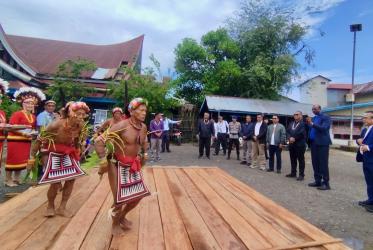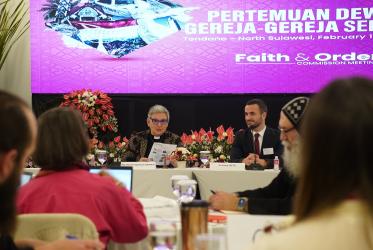Eighteen women theologians from Africa and Asia began a journey of reflection and action around the theme “Women’s Mentoring for Ecumenical Leadership” in a 20-22 April consultation in Bangkok, Thailand. The meeting was convened by the World Council of Churches (WCC) department on Ecumenical Theological Education and supported by the Foundation for Theological Education in Southeast Asia.
The gathering was composed of younger and more tenured female theological educators from different countries in Africa and Asia, such as Kenya, Nigeria, Indonesia and China. They all stressed the importance of nurturing and supporting each other across the regions as they journey towards the full visibility of women’s gifts in church, academia and society. The participants of the meeting were united in their commitment to create space within their own institutions for more intentional mentoring programmes for the advancement of women in leadership positions.
In a powerful case study, Nafkot M. Dessalegn, a young Ethiopian woman studying theology at the Al Mowafaqa Ecumenical Institute of Theology in Rabat, Morocco, described how meaningful a personal and holistic accompaniment would be for her, because she feels sometimes that “being a woman is like a fish living outside the sea.” This resonated with the younger women theologians in attendance, who all valued the initiative of a women’s mentoring programme. The participants of the meeting highlighted how encouraging the interaction between different generations of women theologians was at the meeting, which can serve as a model for further encounters in other regions.
Rev. Prof. Septemmy Lakawa of Jakarta Theological Seminary used the metaphoric image of a kite to describe how women theologise and thereby help to serve as role models and trailblazers for the recognition of women’s leadership in church, academia and society. The participants agreed that it will be crucial to continuously subvert the existing status quo, to push the boundaries that prevent women from exhibiting their full potential towards creating more space for women’s theological expressions in all domains and to particularly support the younger generation of women theologians.
Theological institutions can play a key role by offering room for discussion on women’s leadership, by implementing women’s mentoring programmes and by supporting research and teaching in the field.
The participants agreed on common strategies and decided to form an ecumenical women’s mentoring network, and to open a digital platform for a continued exchange for building a database on potential mentors and their respective areas of specialisation, common research, teaching and publication projects. The new platform of exchange is open for other interested women and men in theological education and will be coordinated by the WCC department on Ecumenical Theological Education, led by Prof. Amélé Ekué.
Learn more about WCC's work on Ecumenical Theological Education




